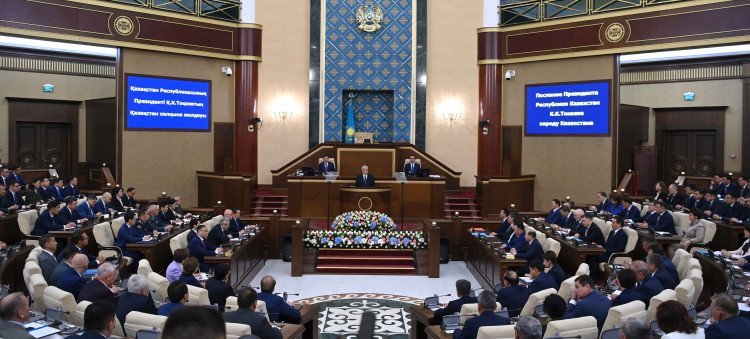Turning into IT Country: Can Kazakhstan Overcome Personnel Deficit?
 coverphotocollage Orda.kz
coverphotocollage Orda.kz
Qasym-Jomart Toqayev has instructed to turn Kazakhstan into a country actively developing the IT field. He also set a goal for the government to increase the IT services’ export volume to one billion dollars. An Orda.kz correspondent spoke with experts in this field and learned about the existing opportunities and obstacles.
A joint session of the chambers of Parliament under the leadership of President Qasym-Jomart Toqayev was held in Astana. The Head of State instructed the government to turn Kazakhstan into an "IT state" and increase information services' export to one billion dollars by 2026.
You know, I pay special attention to the issues of digitalization and innovation. We are facing a strategically important task – to turn Kazakhstan into an "IT country". We already have achievements in the field of digitalization – we are among the world leaders in the e–government and fintech development index, the head of state said.
According to the President, over the past year, the volume of exports of the domestic IT industry has increased fivefold. This figure may rise to $500 million by the end of this year.
 Photo: akorda.kz
Photo: akorda.kzBut this is not a limit. The new task of the Government is to bring the export of IT services to one billion dollars by 2026. This will be facilitated by the opening of joint ventures with large foreign IT companies. The government should make detailed proposals on this issue, Toqayev said.
An Orda.kz correspondent asked experts in the IT field to share their thoughts about Kazakhstan’s potential in this capacity.
"Let the Best Universities Become Even Better”
Pavel Koktyshev is a former deputy chairman of the Board of the national information and communication holding “Zerde”. He is now an entrepreneur and venture investor. In his opinion, Kazakhstan has every chance to become an active digital IT economy. He attributes this to constantly growing trends in the country not only expressed in exports, but also in revenue growth along with new companies.
 Pavel Koktyshev. Photo: Orda.kz
Pavel Koktyshev. Photo: Orda.kzThe market is now at the stage of growth and it will be at this stage for quite a long time. The only thing is that the speed that the president is talking about will, to be honest, requires a lot of mobilization when getting large international companies to (come to - Ed.) Kazakhstan. Also structuring, for example, he devoted a whole block to the development of medium-sized businesses. I believe that in a number of areas, what the president said today about the development of innovations and the development of exports, one of the important key decisions is the development of the venture industry, and he also said this.
Koktyshev believes that even given banks' hypothetical engagement, they have historically not funded the IT industry. A whole parallel venture economy is created for this.
It seems to me that what should be focused on is in the the president's very address – these are venture funds, it is to enable institutional investors, as in the whole world, pension asset managers, insurance company managers and so on to invest in venture funds. Naturally, it will not be their only investment, but, as in the international classics, institutional investors dish out up to 10%, including such highly-profitable, on the one hand, and high-risk instruments as venture. Therefore, venture is more flexible in supporting the IT market.
The expert also spoke about IT specialists’ lack of knowledge. Even with the development of artificial intelligence, the need for engineering specialties and talents is high. And if the state continues to invest in the development of high-quality educational programs and "strong" universities, it will be possible to achieve the "IT-state" goal.
I believe that this story requires specialized tranches and financing because this is a strategic task and, of course, it should not be massive. Only the top five in the ranking of universities should receive this acceleration in IT specialization, education, training, and so on. That is, it is worth allowing the best universities to become even better.
Encouraging Brain Drain
An Orda.kz Correspondent also contacted the President of the Internet Association of Kazakhstan, Shavkat Sabirov. He has more than 35 years of experience in the IT industry.
 Shavkat Sabirov. Photo: profit.kz
Shavkat Sabirov. Photo: profit.kzFirst of all, we need systemic incentive measures for its development. We do not need one-time measures, for example, when relocaters arrive or people start working in IT out of desperation, but there should be measures to support the industry and, especially, for small and medium-sized businesses (SMEs). Why, for example, was it possible to do this in Belarus at one point in time, or did the so-called "tax maneuver" for "IT workers" appear in Russia? We don't have anything so far. To be more precise, everyone in our country is equal – builders, miners, steelworkers, IT workers, and ordinary merchants. No one disputes that IT has made its way into all sectors of the economy, but there must be prerequisites for the market to begin its growth.
Sabirov believes that the growth in the IT services’ exports volume over the past year is actually not an indicator of the growth of the industry in the country, but only indicators of the development of the AIFC (Astana International Financial Center) and Astana Hub.
With all due respect to the AIFC and Astana Hub, they attract investments for the benefits that they have. Therefore, it is necessary to categorize what is being discussed: either the development of the AIFC and Astana Hub, or the entire industry in Kazakhstan. Unfortunately, SMEs, including (in - Ed.) the IT sector, in fact, like all other businesses, simply get by today and do not notice any support measures. Try to sell IT services abroad, you will be lose “your shirt” right away. Decades ago, a "non–resident tax" appeared for services at 20% and continues to exist to this day. But the IT industry is after all services. It's high time to do away with it. In the conditions of digitalization in Kazakhstan, having such a tax is an anachronism.
It may be worth increasing the number of grant places for degrees in this field. Indeed, there is matter of IT specialists working for foreign companies or abroad. It could therefore be assumed that "brain drain" hinders Kazakhstan in becoming an IT country.
However, Shavkat Sabirov believes that it is worth studying this matter more closely. In his opinion, the main problem is that there is no labor market for IT specialists in the country.
Unfortunately, today the situation is such that a huge number of graduates who appear every year in Kazakhstan find themselves out of work because the market is going down and there is no question of its rise. We continue to invest in grants, in education, and so on, but at the same time people are out of work. Therefore, for example, many of our IT specialists are forced to either work for foreign companies because they have work, or they leave to work in Kyrgyzstan or Russia. In Omsk, for example, there are a lot of our IT specialists who work quite successfully.
The matter concerning education again brings us back to the topic of stimulus measures for SMEs' development. According to Sabirov, if a businesses starts persistent operations in tandem with attractive benefits for IT specialists, this area will develop more actively.
Comparatively, at a meeting of the chambers of parliament, the president said that in order to support the manufacturing industry, foreign investors should be exempted from paying taxes and other mandatory payments for three years. The expert believes that this would be worth applying to domestic IT companies.
"And why can't we, our citizens, businesses do this? Why foreigners, and even only investors? Why are we no better? When businesses start to grow, there will be a need for employees, including "IT specialists". And then graduates will quickly find a job. And now, while there are no such measures, almost all graduates are out of work here. In fact, the state itself stimulates "brain drain", and what should they do if there is no work at home? Throughout the history of Kazakhstan, I remember one modest attempt to create preferential conditions for online businesses, but the criteria were drawn up so poorly and rigidly that in three years only one company submitted documents to work on these benefits. Someone should explain to those working and living in Astana about the real situation in the country."
Orda.kz has previously written that 25 thousand residents have received education in the IT field. The Tech Orda program launched in 2021 helped to train specialists. In two years of operations, 20 programming schools have been opened in 12 regions of the country.
Such data was shared by the Director of the IT Industry Development Department of the Ministry of Digital Development, Innovation and Aerospace Industry of the Republic of Kazakhstan, Nursultan Ermanov. Last year, there were more of those who desired to learn about the IT sphere.
The number of such schools has increased to 49 in a year, more than three thousand grants have been issued. According to the ministry, IT academies have been launched in the country together with such major technology companies as Samsung and Huawei. Approximately 4,000 people have graduated from said institutions.
Original Author: Aset Smagulov
DISCLAIMER: This is a translated piece. The text has been modified, the content is the same. Please refer to the original piece in Russian for accuracy.
Latest news
- Timur Kulibayev vs. New Kazakhstan: Oligarch Defends His Assets
- MP supported Imam's Statements About Kazakh Traditions
- Altyn Adam: How Filmmakers Quarreled Over Cartoon About Scythian Warrior
- "No Chance": Russian Deserters' Stories in Kazakhstan
- National Fund Earns As Much As It Spends
- What is Going on with FPL Head's Recent Appointment?
- Stati Case: Victory for Kazakhstan?
- Qataris to Spend $3.5 Billion on Construction of Plants in Kashagan
- Oil Quotas: a Blessing or a Curse for Kazakhstan?
- Plant in Kazakhstan: Swiss Investor Purchased, Legal Battle Follows
- Situation with Russian Securities in Kazakhstan Explained
- Uranium Mining Tax in Kazakhstan to Change Starting in 2025
- Chinese Oil Giant to Build Wind Farm in Kazakhstan
- Expert Explains Toqayev Greeting Xi Jinping in Particular Way
- Scandal around "Aria-Zhana Astana", Controlled by Satybaldy, Not Subsiding
- SCO Summit in Astana: What to Expect?
- Who Was Oppositionist Aidos Sadykov?
- KNB Agent Orik VS Financial Police Agent Sanych
- Nazarbayev's Relatives on Trial: Systemic Purge or Political Games?
- Fire in Greece: Luxury Yacht, Kazakhstani Oligarchs' Vacation Scandal

